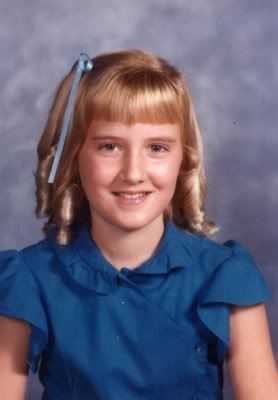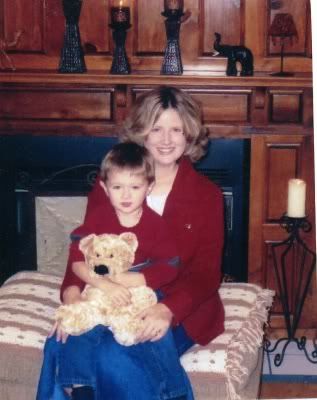Once Upon a Time
Once upon a time, in a very small town, there were three children.
There was Lee, who lived in many different places, but who spent a lot of time--after school, during the summers, and sometimes actually living there--at her grandparents' house.
There was Dallas, who lived on the next block and three doors down.
And there was Jill, who lived one street over in the other direction. Her backyard adjoined Lee's grandparents' backyard.
Dallas's house had no yard at all to speak of. Jill's house had a nice backyard with a new swingset and trapeze bars and a see-saw, but there were dogs there, and Lee refused to set foot on that side of the fence. So the children usually wound up in Lee's grandparents' backyard, which was huge and had a garden and a shop and a playhouse and an old swingset and a tire swing which doubled as a rope ladder and a basketball hoop nailed to a tree and clothesline poles to hang upside down from.
And if the backyard got boring, there were skates and bicycles to ride all over the neighborhood, because this was before everybody worried about kidnappers and perverts, and the only rules were Stay Outside (Don't Go In Other Kids' Houses and Bother Their Parents), and Be Home Before Dark.
Later on, when Lee was older and read To Kill a Mockingbird, the character Dill reminded her in many ways of Dallas. Dallas was smart--brilliant, even--but didn't have many friends. He was an only child (at that time) and his parents were divorced. He was used to getting his own way, and he hadn't learned yet how to hide the fact that he was smarter than most people. He had a quick temper and would punch and pull hair and curse if provoked. He told lies, which the girls despised, and dirty jokes, which the girls considered to be disgusting but educational. But he was also imaginative and creative, and would make up stories and games to entertain them, and when he wanted to be nice he had the sunniest smile imaginable and could always make them laugh.
Jill was also an only child. She always had new clothes in the latest styles and the newest toys, and she was used to getting her own way as well. Her mother liked to fix her hair in long blonde ringlets, like Nellie on Little House on the Prairie, and like Nellie, Jill wanted to be in charge of everything. But Jill also had fun with just about everything. Lee tended to take things too seriously, and Jill taught her to find the funny side of every situation and every person, and encouraged her to take risks. Jill was not afraid of anything.
When Jill got too overbearing, Dallas would yell at her and refuse to play by her rules, and Jill would stomp home in a huff. Dallas was impervious to normal insults, but the girls had discovered his weakness, as girls do. His mother had remarried and Dallas was given his stepfather's last name. When Dallas got too vulgar, the girls would call him by his original name, and Dallas would go home crying with rage.
Lee never went home mad because she was usually already "home". She switched sides randomly and banded with whoever was being least annoying at the moment. But when she did get irritated, she had a foolproof way of getting rid of both of them. She would sing, "Jill and Dallas, sittin' in a tree..."
But it was a very small town, and it was more than just happening to live close together. There was only one elementary school, so they all rode the bus together. They all had classes together. Nobody had heard the word "gifted" then, but five or six kids in the elementary school, including Dallas and Lee, attended a class twice a week for a few hours where they watched instructional films and learned about computers (back in the very early '80's, when nobody knew much about computers) and played games and put on plays. Lee and Jill went to the same church, although Jill's parents were a lot less strict and she was allowed to wear shorts and pants, and they were in Sunday School classes together, although they weren't allowed to sit together in church too often, because they always got in trouble when they did. When they were very small, Jill's mother was their Sunday School teacher. Dallas and Lee took piano lessons after school from the same teacher.
And because they did live close together, and because they did have so much in common and they did keep each other entertained, they kept playing together. Despite somebody stomping off mad or going home crying at least once a day, they always came back the next day like nothing had happened.
Dallas and Lee invented long and complicated games that involved croquet wickets, baseballs, hula hoops, and trees as bases. Jill and Lee made up imaginary horror stories, including one about Lee's great-grandfather's ghost haunting an old storage shed in the backyard, and all three children ran shrieking all over the neighborhood, hiding from shadows, for weeks based on that one. They played school and house and church and spies and cops-and-robbers and cowboys-and-Indians. They held contests to see who could turn the most somersaults in a row. Jill tried to teach Lee and Dallas to turn cartwheels, and Dallas succeeded better than Lee, although Lee argued that she was hampered by having to wear skirts. Jill taught Lee to make prank phone calls. Lee taught Jill and Dallas to walk on stilts. The three of them spent most of their time--when they weren't fighting--doubled over laughing.
There were other children, of course. There were Victoria and Carolee and Alison and Shannon. But only Victoria actually lived nearby--the others were there often visiting their grandparents--and only Victoria was in the same grade--the others were just a bit younger. And even Victoria didn't have the connections through church and piano and special classes that the others did. So even though there was a large group of neighborhood friends, it was always Jill and Dallas that Lee remembered later.
Then Lee's family moved away.
She went back for summers. She went to Youth Camp with Jill, as they had always done, and they both received the Holy Spirit the same week and were both baptized that Sunday night in the Smalltown church, even though technically Lee didn't attend there anymore.
But they got older and older, and Lee made more and more friends in her new city and came back to Smalltown less and less often. When she would visit, she'd look through the backyard where she could see Jill's black Blazer parked on the road, and wish she could still go outside and wait for Jill to step through the gate dividing their yards. But they wouldn't fit into the playhouse now, nor on the swings, and nobody rode bikes when they could drive cars. Dallas had a red sports car, and he never came walking over.
Lee did see them occasionally at the annual Railroad Festival. Dallas was suddenly much taller than Lee, and had learned to be charming and to get along with people. He hadn't stopped being brilliant, though. Lee's grandmother sent clippings to her from the local newspaper of all the awards he'd won and the straight-A grades he made and all the clubs he was president of. If Lee saw Jill, they'd walk over to the little kids' playground and sit on swings, talking and catching up. Jill and Dallas were always friendly when she saw them, but as time went by, they had fewer and fewer things to talk about.
Sometime in her senior year, Lee was invited to spend a weekend at Centenary College in Shreveport. She was supposed to go with a friend, but the friend backed out. She went anyway, and ran into Dallas, who had also been invited. They found an ice cream shop that was open late and sat and talked for a while, about high school and their plans for college. Then some college kids that neither of them knew invited them to someone's dorm room to watch a movie, and they went along, figuring as long as they were both there, they'd be okay.
Lee can't remember now whether Dallas was already battling leukemia at that time, or whether that didn't come until college, but she enjoyed that time with him, knowing that she wouldn't be likely to see him again. Centenary had a strong musical program, and Dallas was very musically inclined. He played instruments and sang in the choir. He intended to accept the full scholarship they were offering him, and Lee knew she wouldn't be able to afford to attend there.
Life happened. Lee got married. Jill and Dallas finished college. Dallas decided to be a lawyer, and went on to Duke University. Lee got pregnant. Dallas lost his fight with leukemia in March of '96. He, and Jill, had just turned twenty-three. Lee turned twenty-three in July and had her baby in September. She had the baby dedicated in Smalltown, at the same church where she and Jill had been baptized and where Dallas' funeral had been held, even though he wasn't a member there. There wouldn't have been room in his church for all the people who came to his funeral, and besides, he wanted music for his funeral, and his denomination didn't approve of music in church.
Life kept happening. Lee heard from her mother that Jill had, after some uncertain teenage years, found a strong faith in God for herself instead of believing because it was what she had been brought up to do. She was attending prayer meetings and testifying about the things that God was doing in her life. She was a Sunday School teacher.
Jill got married. She got pregnant, found out she had breast cancer, and found out her marriage was not very stable (not necessarily in that order). She had a little boy who looked just like her.
Lee got pregnant again and had another little girl. When her older daughter went to Smalltown to visit, Jill was her Sunday School teacher. Lee didn't get to see much of Jill when she would visit, as Jill was always in the Sunday School rooms, but when she would see her, at church or at the Festival, Jill would always have a smile and a hug for her, and usually a funny story to tell. They would discuss wigs and remission and Sunday School--Lee was teaching at this time, also--and small children. They didn't discuss it when the cancer came back and spread, though, because Lee didn't see Jill after that.
**********************************************
This past weekend Lee went back to Smalltown to see Jill one more time. Jill's friends spoke about how much fun she always had and how strong her faith was. They recounted some of her "blonde" moments. They talked about her little boy, who started kindergarten last week, and how Jill cried because she was in the ICU and couldn't be there for his first day of school. The church was standing room only; the balcony was overflowing. Someone sang "How Great Thou Art". An old friend, the same one who had sung at Lee's first daughter's dedication, sang "I Can Only Imagine".
Then they went to the cemetery where the pastor said a few more words, keeping it very brief because it was broiling hot, and as Lee walked away she saw Dallas' grave, ten years old now, only fifteen or twenty feet away from the newly-dug one.
Once upon a time there were three children...
***************************************************


****************************************************
http://www.mem.com/display/Biography.asp?id=1483777